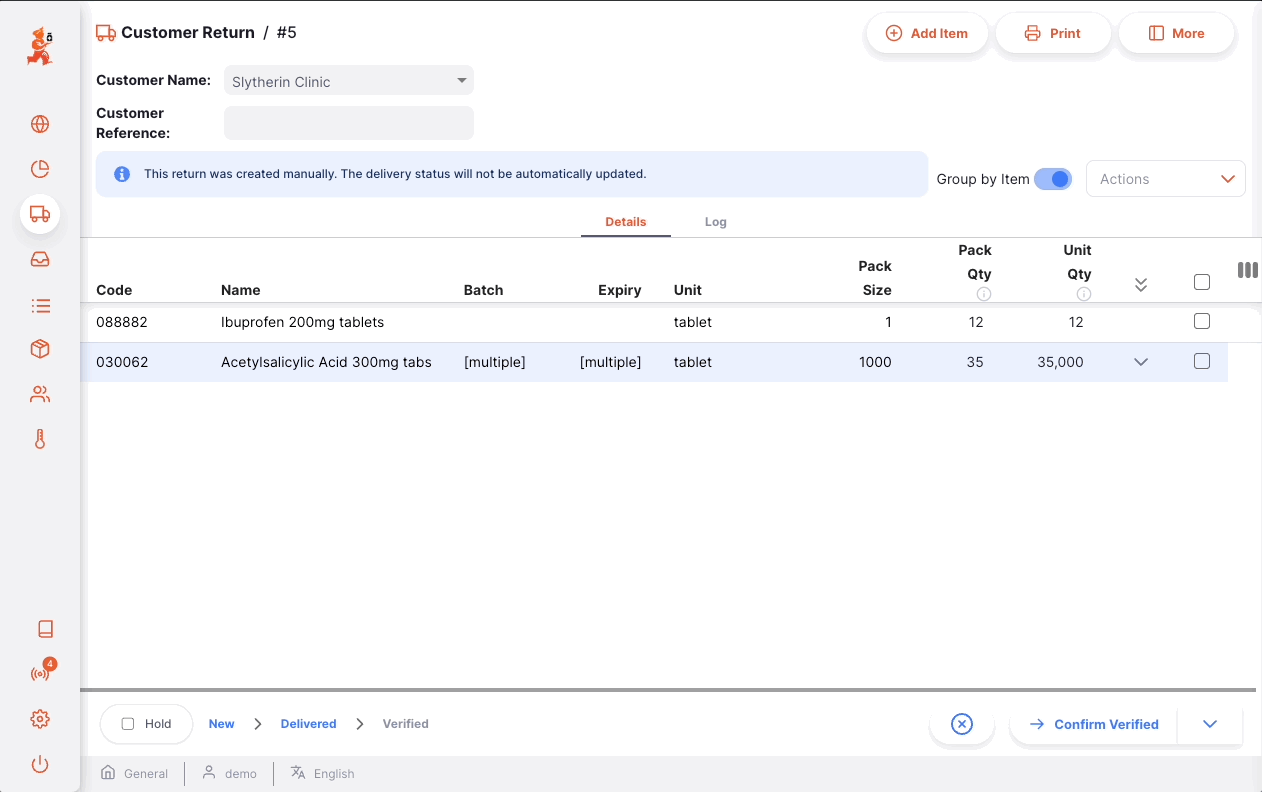Inbound Returns
An Inbound Returns is used to record stock which is returned by a customer.
It is important to be able to receive goods back from a customer without it being counted as goods coming from a supplier. If your customer issues the goods to you on an Outbound Shipment, and you then receive it through an Inbound Shipment, then those goods will be counted as part of your store's 'supply' from suppliers, which is not correct. An Inbound Return is the right way to receive goods back from a customer.
If you have used mSupply in the past, you may be familiar with the term Customer Credit instead of Inbound Return.
All goods returned by a customer should be recorded in mSupply with an Inbound Return. They are created automatically, as a result of an Outbound Return created by another store in Open mSupply, and can also be entered manually.
Viewing Inbound Returns🔗
Open the Inbound Returns Menu🔗
Choose Distribution > Inbound Returns in the navigation panel.
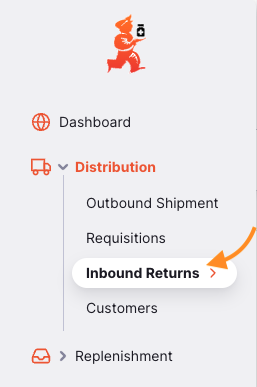
You will be presented with a list of Inbound Returns if some have been created already.
From this screen you can:
- View a list of Inbound Returns
- Create a new Inbound Return
- Export Inbound Returns to a
.csvfile
Inbound Return list🔗
- The list of Inbound Returns is divided into 6 columns:
| Column | Description |
|---|---|
| Name | Name of the Customer |
| Status | Current Status of the return |
| Number | Reference Number of the return |
| Created | Creation date of the return |
| Comment | Comment for the return |
| Reference | Customer reference |
- The list can display a fixed number of returns per page. On the bottom left corner, you can see how many returns are currently displayed on your screen.

- If you have more returns than the current limit, you can navigate to the other pages by tapping on the page number or using the right of left arrows (bottom right corner).

- You can also select a different number of rows to show per page using the option at the bottom right of the page.

Search by Customer Name🔗
You can filter the list of returns by customer name or by status. This can be useful if you're looking for one particular return!
For example: Select the Name filter from the list to filter by the customer name. Type the name of a customer in the Name field. All the returns for this customer will appear in the list.
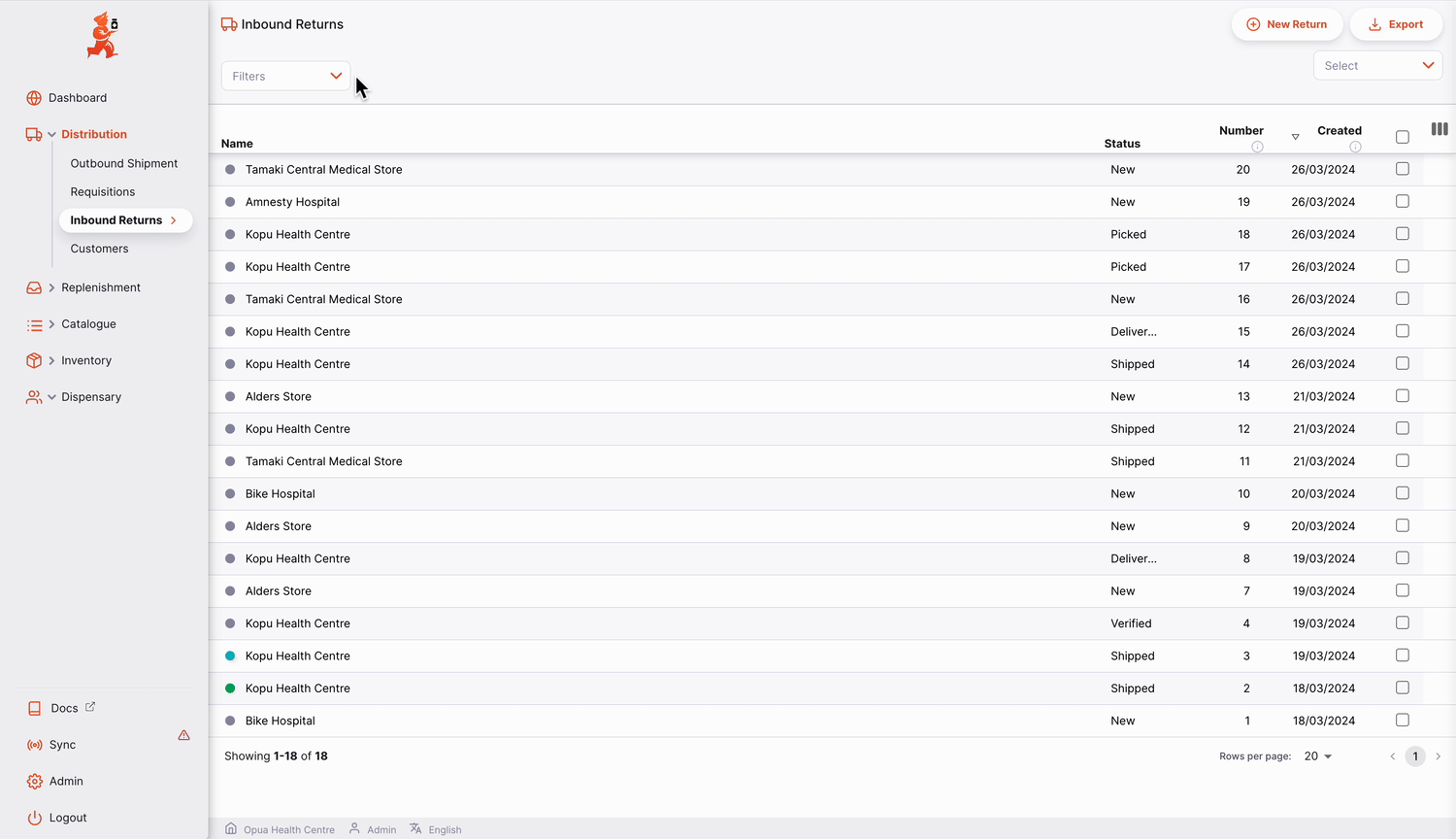
Exporting Inbound Returns🔗
The list of Inbound Returns can be exported to a comma separated file (csv). Simply click the export button (on the right, at the top of the page)

and the file will be downloaded. The export function will download all Inbound Returns, not just the current page, if you have more returns than the current page limit.
Delete an Inbound Return🔗
You can delete a return from the Inbound Return list.
-
Select the return that you want to delete by checking the box on the left end of the list. You can select more than one return to be deleted. You can even select them all using the master checkbox in the list headers.
-
Open the
Selectdropdown (top right corner, above the list) and selectDelete selected lines. -
A notification confirms how many returns were deleted (bottom left corner).
NEW.
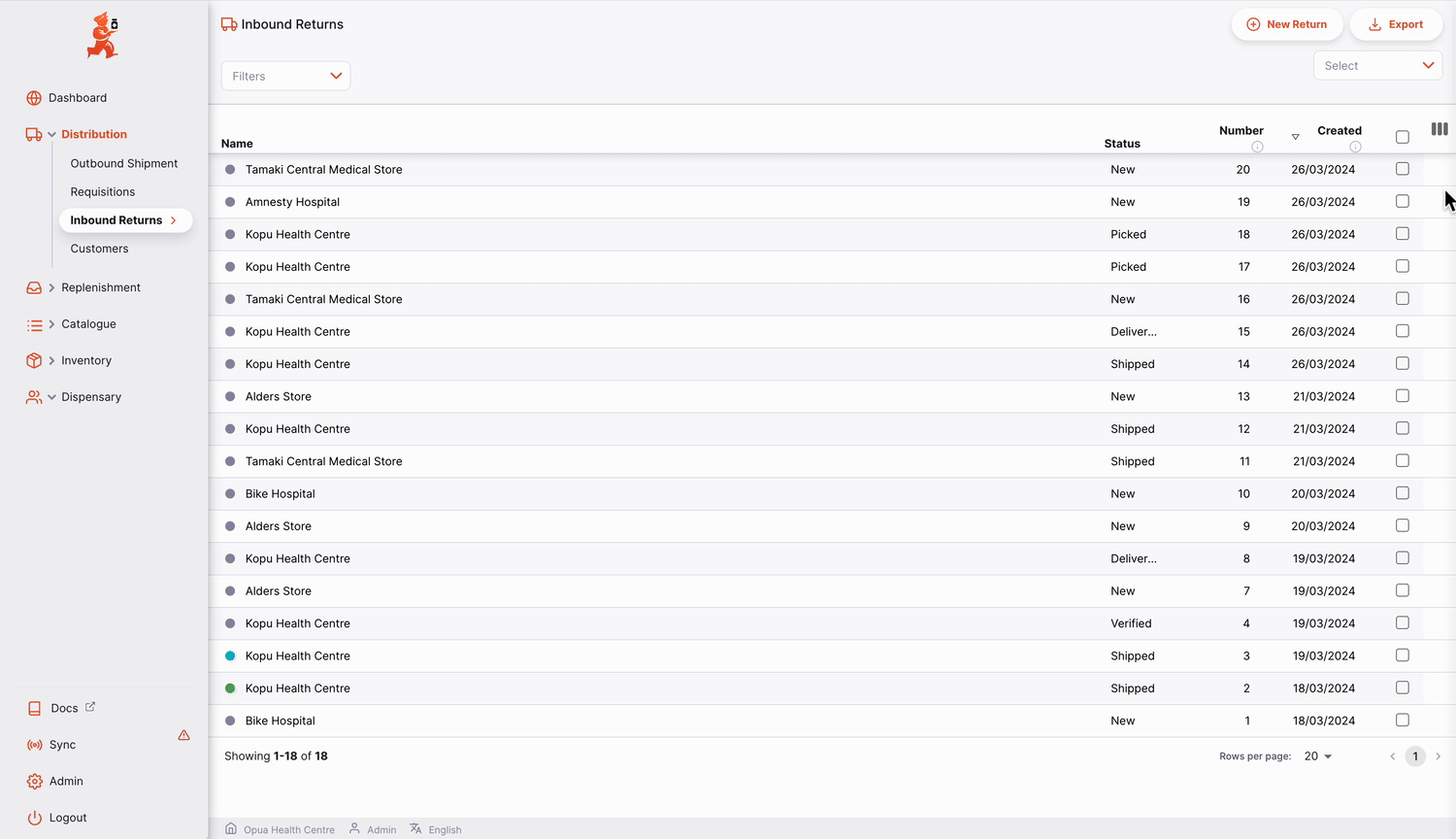
Creating an Inbound Return🔗
Inbound Returns are created automatically, when an Outbound Return is created by another store. If needed, they can also be created manually, as explained below.
Create from Outbound Shipment🔗
Often, you will be processing the return of goods that you sent via an Outbound Shipment. In this case, you can create an Inbound Return from the Outbound Shipment itself.
Create manually🔗
-
Go to
Distribution>Inbound Return. -
Press the
New Returnbutton, in the top right corner

- A new window
Customersopens, inviting you to select a customer.
Select a Customer🔗
- In the
Customerswindow, you will be presented with a list of available customers. You can select your customer from the list or you can filter by typing the customer name.
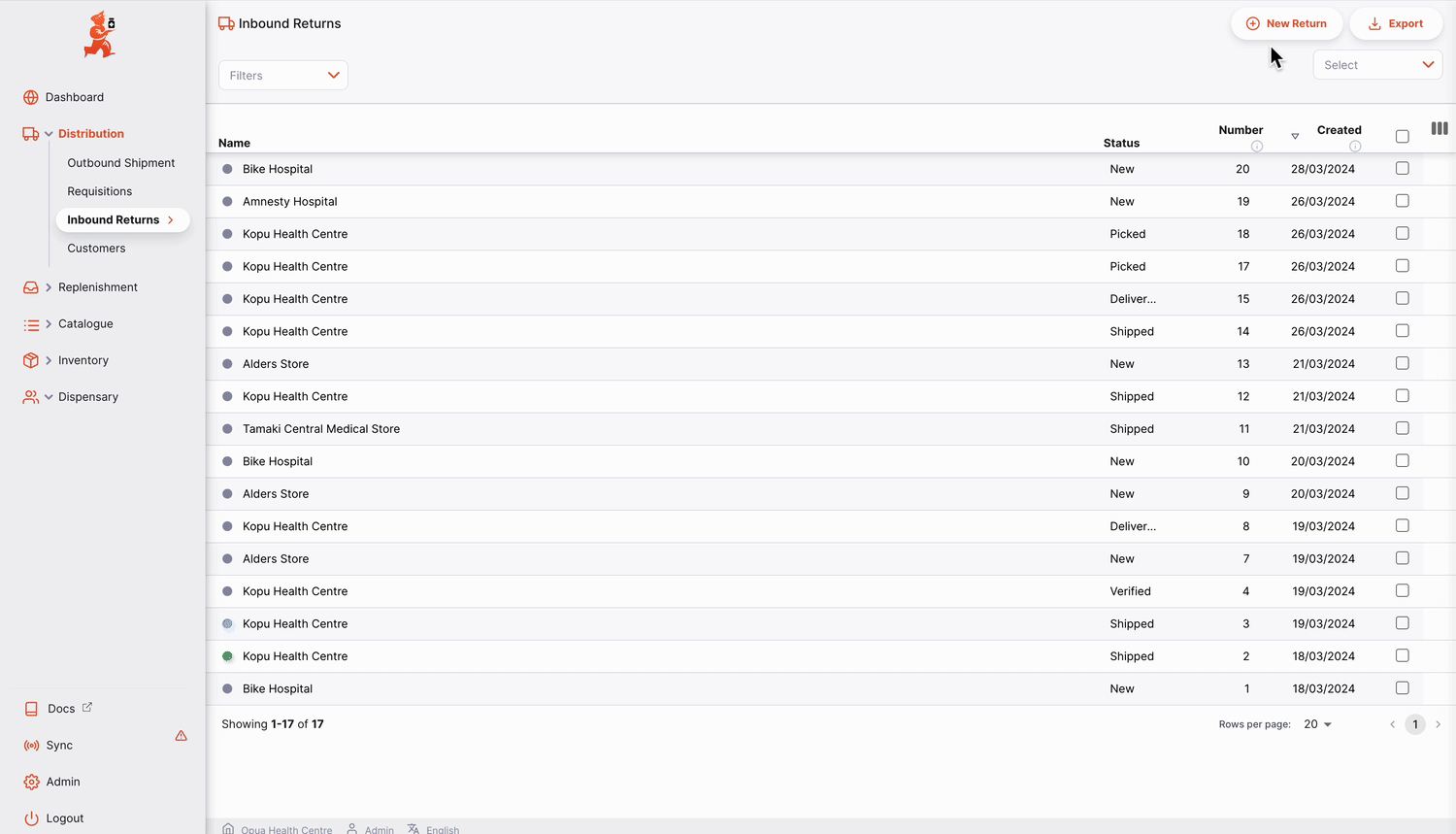
- Once you tap or press
Enter, or click on a customer, your Inbound Return is automatically created
If everything went well, you should see the name of your customer in the top left corner and the status should be NEW
Enter a Customer Reference🔗
Once your Inbound Return has been created, you can enter a customer reference in the Customer Ref field, if they have one (eg. PO#1234567)
Inbound Return Information Panel🔗
The Information Panel allows you to see or edit information about the Inbound Return. It is divided into multiple sections:
- Additional Info
- Related Documents
- Transport Details
We are planning to add more sections in the future as Open mSupply grows.
How to open and close the Information Panel?🔗
If you are using a large screen, the information panel will be automatically opened for you. However, on an average sized screen, the information panel will be closed by default.
To open the Information Panel, you can tap on the More button, located in the top right corner of the Inbound Return view.
You can close by tapping on the X Close button, on the top right corner of the information panel.
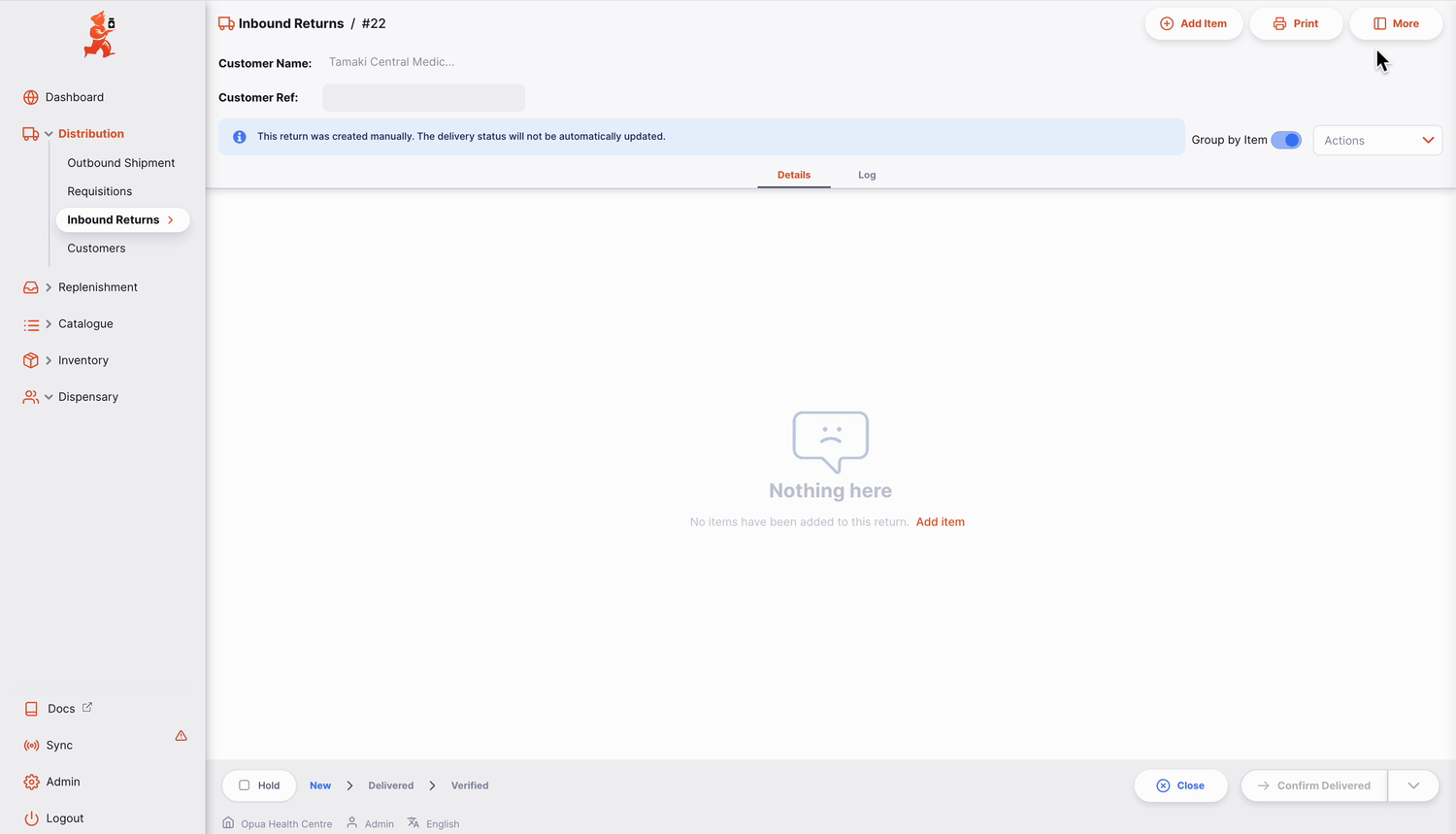
Additional Info🔗
In the Additional Info section, you can:
- See who created the Inbound Return (name of the user)
- View and edit the Inbound Return color. To edit the color, tap on the coloured circle and select a color from the pop-up
- Write or edit a comment
Related Documents🔗
In the Related Documents section, you can see other related transaction documents for the Inbound Return.
If your Inbound Return was created from an Outbound Shipment, the reference number of the Outbound Shipment would appear in this section.
In the future, we would also include other documents such as transportation documents or pick slips.
Transport Details🔗
If your Inbound Return was created automatically, via an Outbound Return from another store, you will see a Transport Details section. Here, you can see a transport reference (e.g. a booking or tracking number.)
Actions🔗
- Delete: You can click the
Deletebutton to delete the return. You can only delete Inbound Returns while they are inNEWstatus. - Copy to Clipboard: You can click the
Copy to Clipboardbutton to copy the invoice details to the clipboard.
Inbound Return Status Sequence🔗
The status sequence is located at the bottom left corner of the Inbound Return screen.
Passed statuses are hightlighted in blue, next statuses appear in grey.

NEW.
SHIPPED.There are 5 status for the Inbound Return:
| Status | Description |
|---|---|
| New | This is the first status when you create a new manual Inbound Return |
| Picked | Customer has confirmed that the return is picked and is ready to ship (only applies to automatically created returns) |
| Shipped | Return has been shipped and goods are now in transit (applies only to automatically created returns) |
| Delivered | When you confirm that the return has been delivered |
| Verified | When you have verified the Inbound Return |
You probably noticed that two of the status values only apply to automatically created shipments. These are created by the system when another store in the system creates an Outbound Return to return stock to your store. If this is the case you'll see a message near the top of the page:

Note that this message appears differently if the status is Delivered or Verified

If, however, you've created an Inbound Shipment manually, then the following message shows:

and you'll see that the status bar has only the status values which apply to this type of shipment.

New.If you hover over the status sequence, a return history window appears. You can see the date when a return was updated from one status to another.
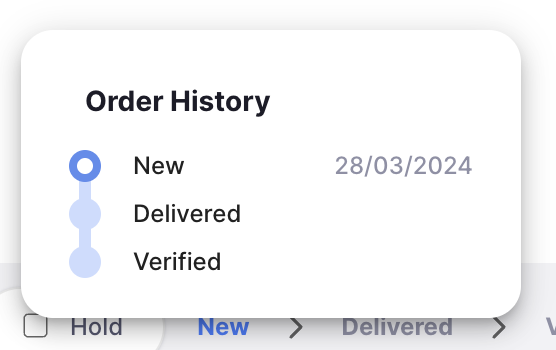
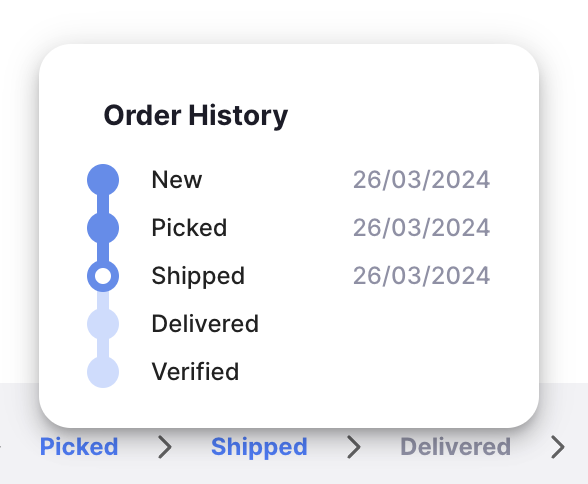
Hold checkbox🔗
Located on the bottom left corner, on the left of the status sequence.
Checking the Hold checkbox prevents the Inbound Return from being updated to the next status.

Close and Confirm button🔗
Close Button🔗
Tap on the Close button to quit the Inbound Return view and return to the Inbound Returns list.
Confirm Button🔗
The Confirm button updates the status of a return. The status which you can confirm depends on the current status of the return and follows the sequence shown below.
When managing an Inbound Return, you can only confirm it as Delivered or Verified.
| Confirm... | Current Status | Next Status |
|---|---|---|
| Confirm Delivered | Shipped | Delivered |
| Confirm Verified | Delivered | Verified |
For manual Inbound Returns, you don't have to update to the next status in the sequence. You can choose to skip Delivered to go directly to Confirm Verified.
As demonstrated below, tap on the down arrow of the Confirm button and select the status you want the return to be updated to.
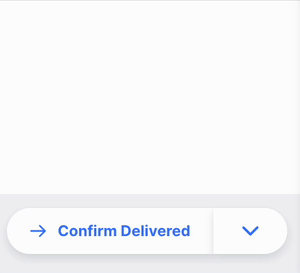
Adding lines to an Inbound Return🔗
Tap on the Add Item button (top right corner).
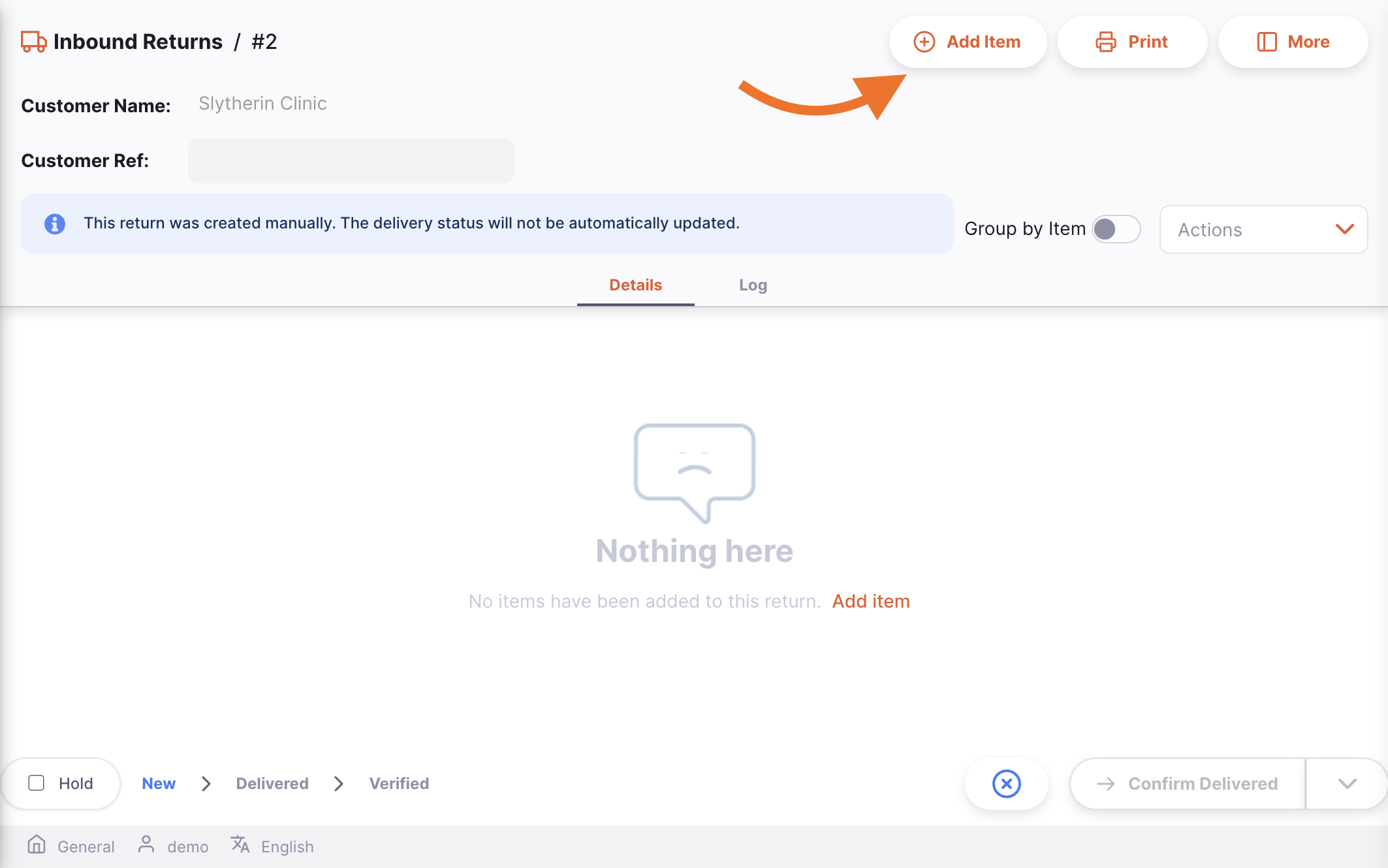
Select an Item🔗
A new Add Item window opens. In the Add Item window, you can look up an item by:
- Reading through the list of available items
- or by typing some or all of the item name
- or by typing some or all of an item code
Once your item is highlighted, tap on the name or press Enter.
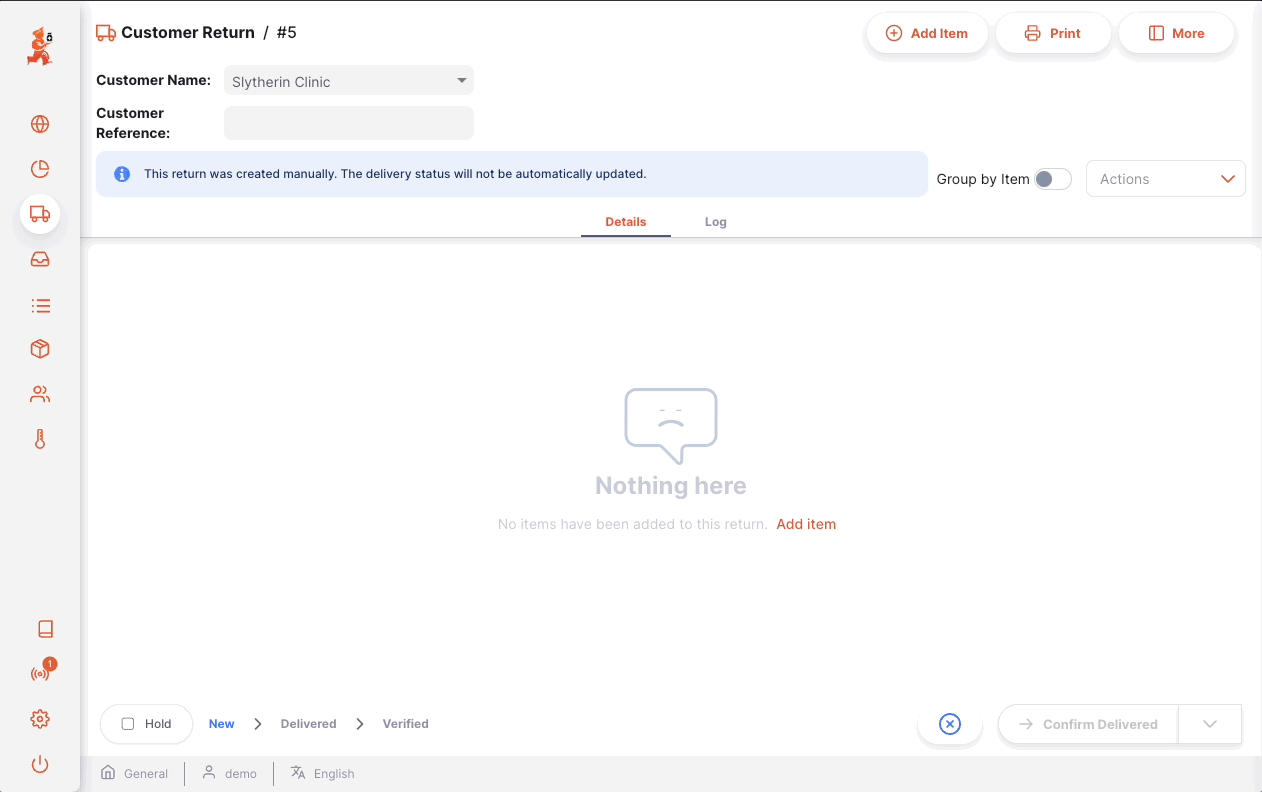
Select quantities step🔗
In the Select Quantities step, you can enter the following fields:
- Code: Item code
- Name: Item name
- Batch: Batch number. It is a designation given to products made in the same manufacturing run.
- Expiry: Expiry date of the batch (format: MM/YYYY)
- Pack Size: Quantity of units per pack
- Pack Quantity Issued: Number of packs that were issued in the Outbound Shipment
- Quantity Returned: Number of packs to be returned
If you are receiving more than one batch number for the same item, you can add lines with the Add Batch button.
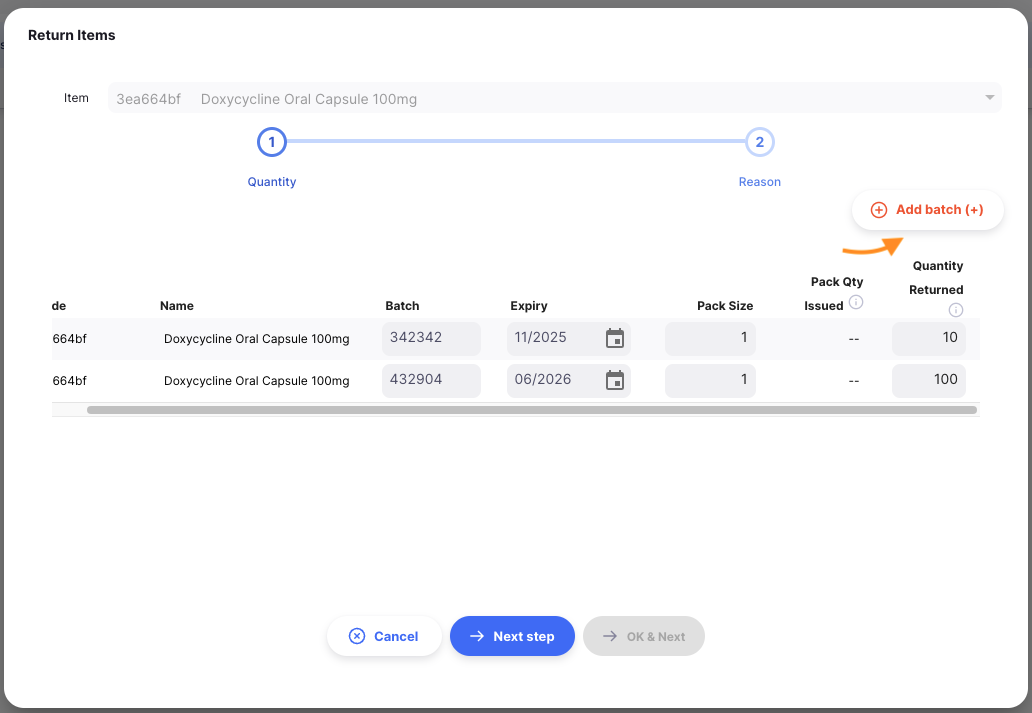
Warnings🔗
You may see one or more warning messages on this screen.
If you forget to enter a Quantity Returned for any batch and click Next step, you will see this warning message. You'll need to add a returned quantity for at least one batch. You can click Cancel if you no longer want to process the return of any of this stock.
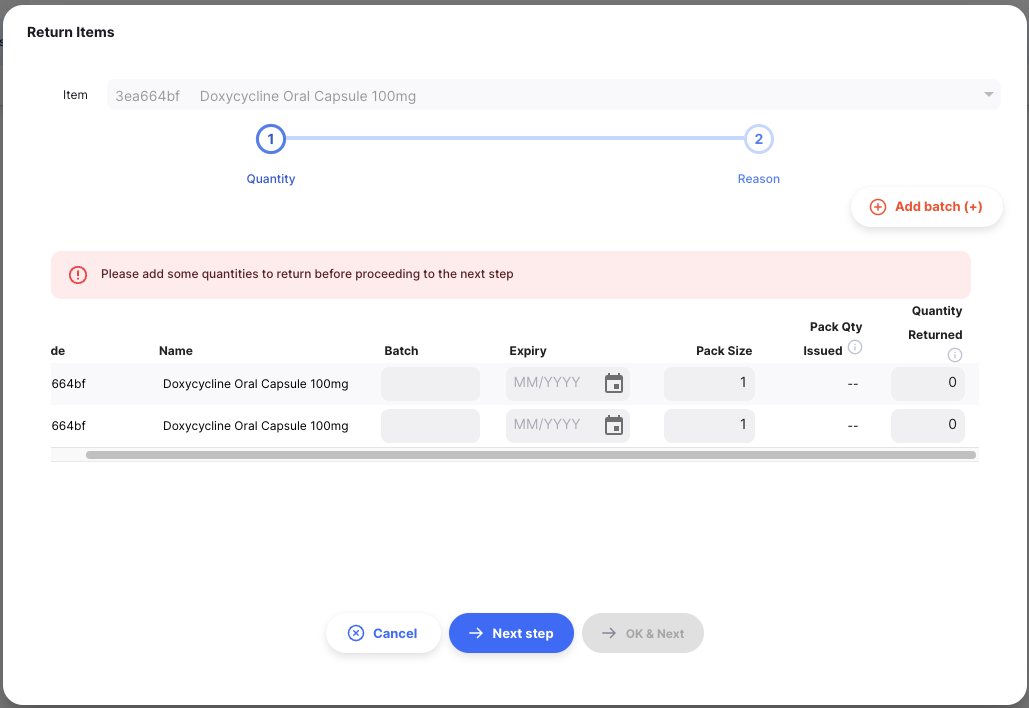
Provide Reasons🔗
Return reasons are configured on the mSupply central server via options
When you are happy with the batch info and return quantities, you can press the Next step button. The list of batches will be filtered to only include the batches you set a return quantity for. In this view, you can enter a reason for the return of each batch, and an additional comment.
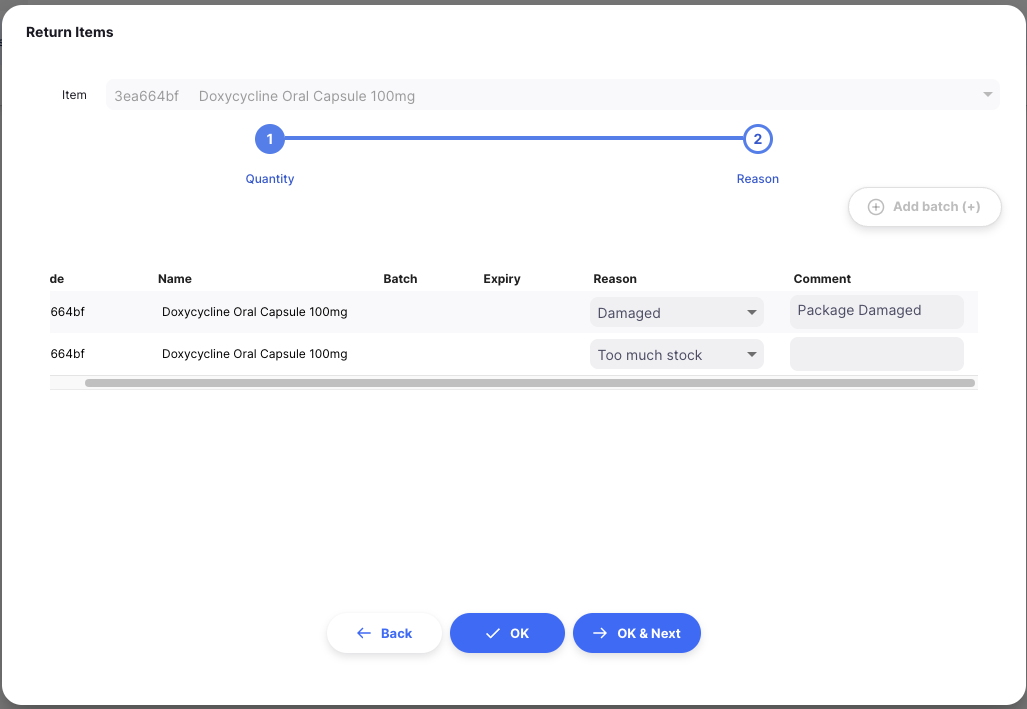
Confirm🔗
When you are happy with the quantities and reasons, you can press on:
- the
OKbutton. Your item will be added to the Inbound Return - the
OK & Nextbutton to add another item right away - the
Backbutton, to go back to theSelect quantitystep
Editing an Inbound Return Line🔗
To edit a return line, tap on it. You will be presented with the Edit Item window, which is identical to the Add Item window, except that the item is already chosen.
Edit a Return Line🔗
VERIFIED.
-
Open the Inbound Return you want to edit.
-
Tap on the line you want to edit. An identical window to
Add Itemappears. At this stage you can:- Edit batch info
- Edit quantity returned for each batch
- Click
Next stepto view/adjust the reasons and comments
If you set the Quantity Returned to 0, that line will be removed from the return.
If you set all return quantities to 0, and click Next step you will see this warning message. It is informing you that no return quantities were provided; from here you can click OK again to confirm, in which case the window will close and all lines for that item will be removed.
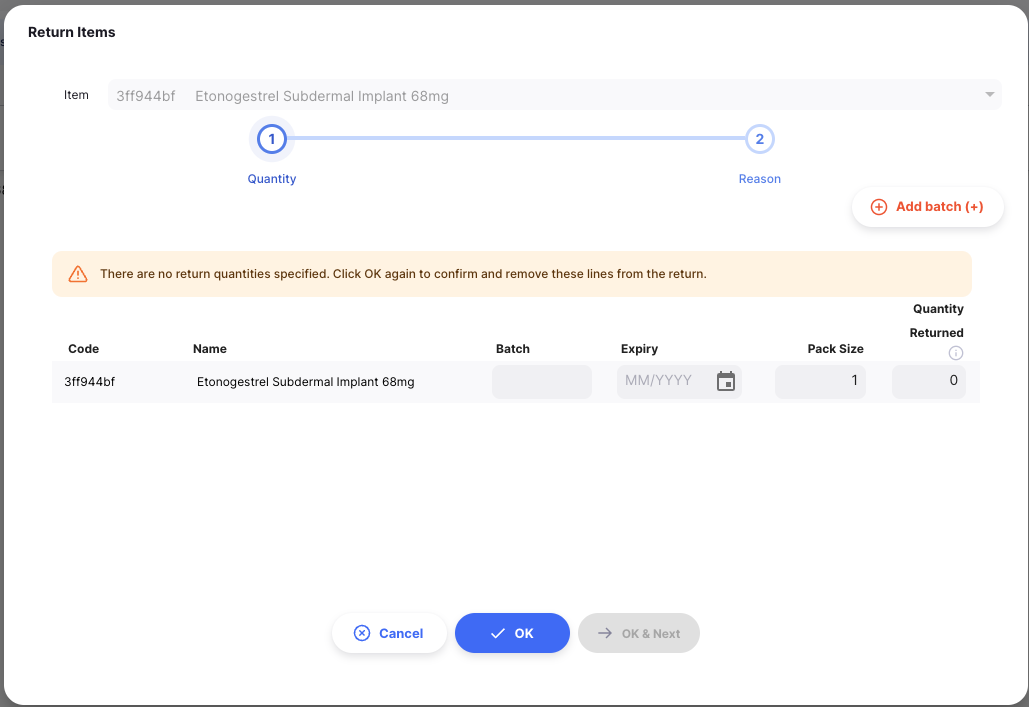
Delete a Return Line🔗
- Open the Inbound Return you want to edit.
- Select the line(s) you want to delete by checking the box(es) on the right of the list.
- Go to the
Actionsdropdown menu (top right corner, above the list) - Select the action
Delete selected lines
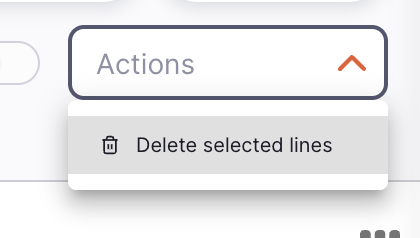
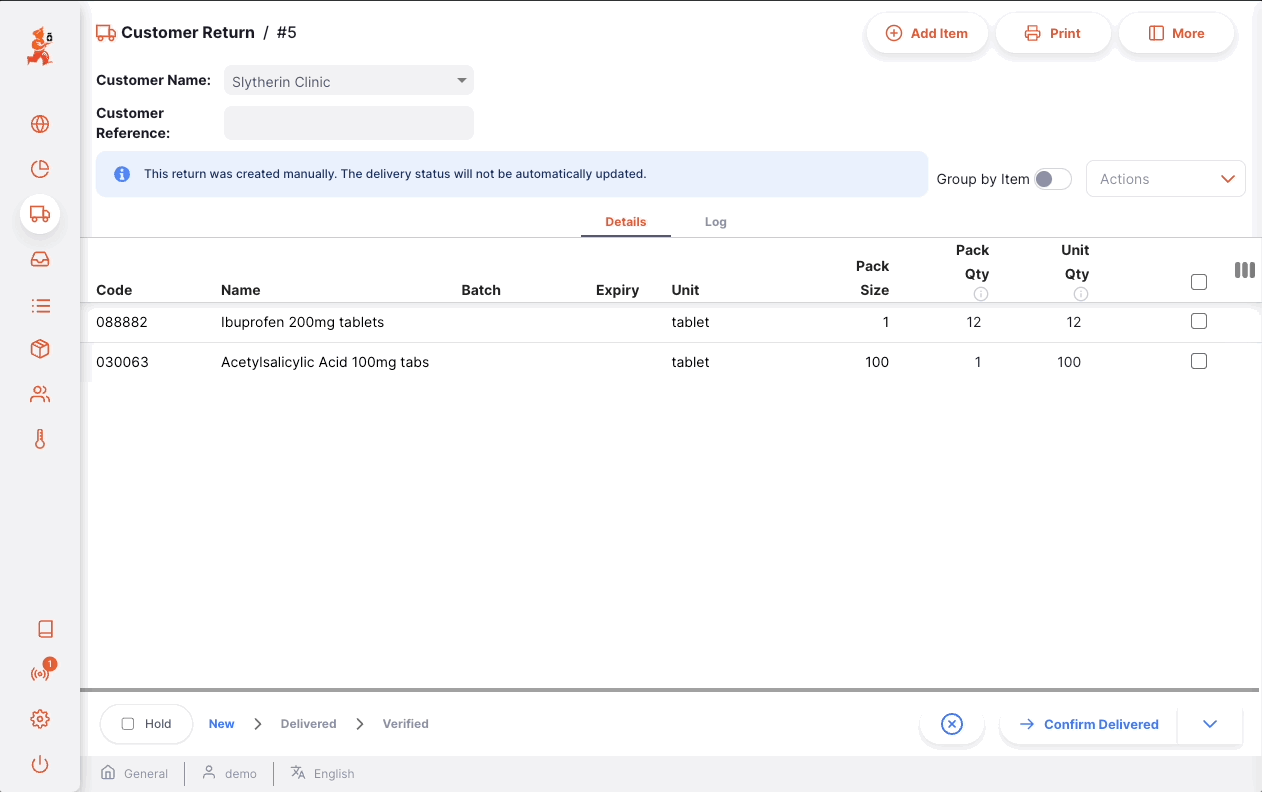
Receiving an Inbound Return🔗
Confirming the delivery of the return🔗
Whether your Inbound Return is manual or automatic, the first step to receive the returned goods is to confirm the delivery.
At this stage, you don't have to check if quantities or other information are correct, you just have to acknowledge that you have received the returned goods from your customer.
To confirm that an Inbound Return has been delivered, click on the Confirm Delivered button.
Once you have done this:
- Goods are now part of your inventory
- Return status is now
DELIVERED
SHIPPED before you can confirm that you have received the returned goods.
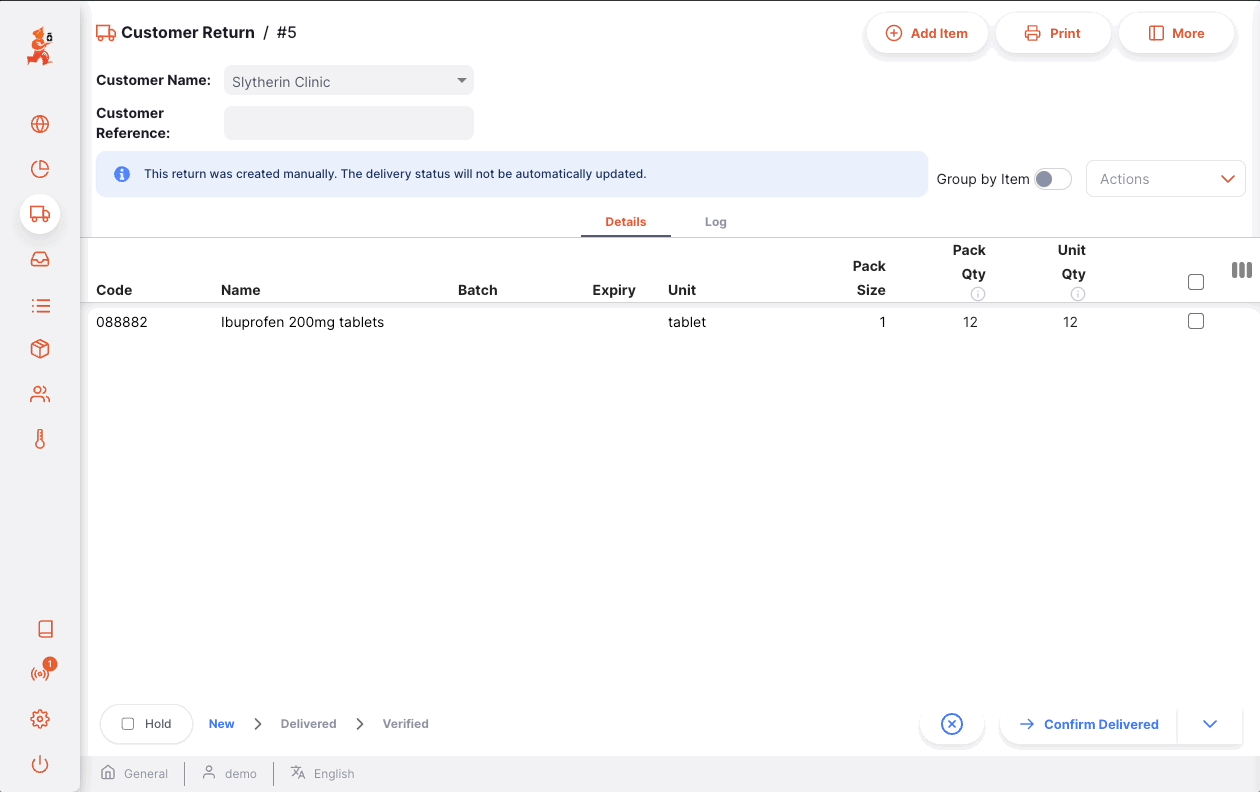
Verify your Inbound Return🔗
Verification is the last step to receive returned goods in mSupply. At this stage, you can check what you have received and make sure that the information in mSupply is correct.
You have the possibility to verify the following information:
- Batch numbers and their expiry dates
- Quantity of packs and pack size
- Return reasons
Once all information has been captured or verified, you can confirm the Inbound Return as VERIFIED by tapping on the Confirm Verified button.
Once you have done this:
- Inbound Return status is now
VERIFIED - You can no longer edit return lines
- You can no longer delete the return
Viewing an Inbound Return🔗
When viewing a specific return, you can view the batches on that return grouped by item or with each batch listed separately.
To change the view mode, click the Group by item switch.
When grouped by item, you can expand the item to see individual batches, or use the expand in the table header to expand all grouped rows.
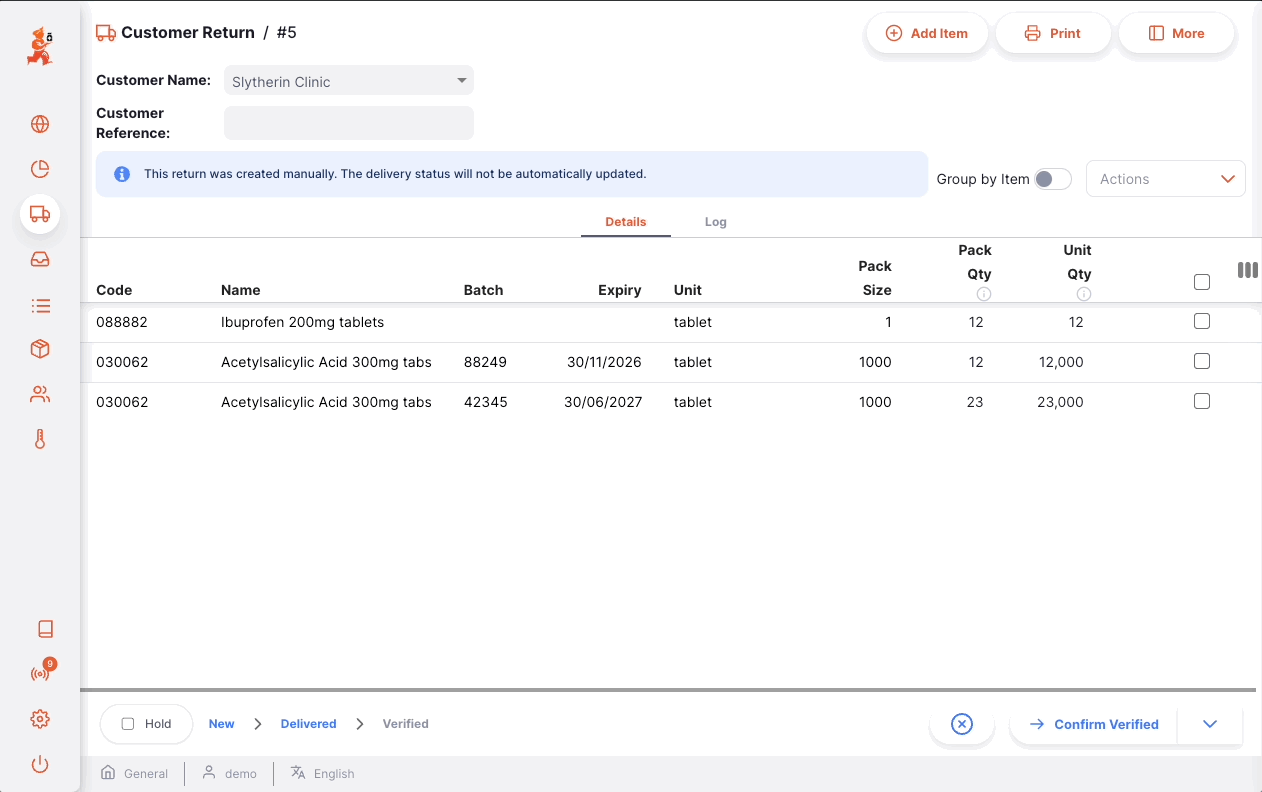
If you do not have enough room on your screen, or simply aren't interested in some of the columns shown, you have the option of hiding which columns are shown in this view.
Click on the Show / hide columns button which is at the top right of the table. This gives a list of the columns available - you can check the columns you want to see. The options chosen are stored for the current browser, so next time you view an Inbound Return, you will see the selected columns only. If you have chosen which columns to show, then the button is shown in blue to remind you that there are more columns available.
